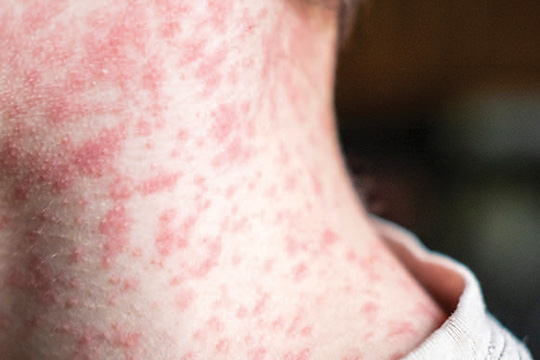
 Uzma Hasan, MD
Uzma Hasan, MD
Clinical Associate Professor, Rutgers NJ Medical School
Division Director, Pediatric Infectious Diseases,
Cooperman Barnabas Medical Center
Eileen Yaney, MS, CIC
Administrative Director, Infection Prevention and Control, Cooperman Barnabas Medical Center
Karen Williams BS, MT (ASCP)
Infection Preventionist, Cooperman Barnabas Medical Center
Al Fortner
Director, Fire and Safety, Cooperman Barnabas Medical Center
Measles
- As of Nov 21, 2024, 280 measles cases have been reported from 32 jurisdictions, including 16 outbreaks.
- As of Nov 25, 2024, 7 measles cases have been reported in New Jersey
- 2 cases in NJ as of September 2024
- Measles virus is an enveloped RNA virus with 1 serotype, classified as a member of the genus Morbillivirus in the Paramyxoviridae family
- Humans only natural host
- Spread droplet/airborne
- Attack rate: 90%
- Population immunity as high as 95% or greater is often needed to stop ongoing transmission
- Typically occurs in Late winter and spring
- Prior to vaccine: killed 2.6 million people/year
- Virus can induce immune system amnesia!
- Most measles cases occur from unvaccinated US travelers traveling overseas; top 5 source countries India, Phillipines, China, Pakistan, UK
- Clinical features: fever, cough, coryza, conjunctivitis, maculopapular rash, Koplik spots
- Complications: Diarrhea: 8%, Otitis media 7-9%, Pneumonia 1-6% (1 in 20 cases), Hospitalization: 1 in 4 cases, Encephalitis 1 per 1000 cases, Subacute sclerosing panencephalitis 7-11 per 100,000, Death 3 per 1000 cases
- Diagnosis: Oropharyngeal/nasopharyngeal swab (rRTPCR), Urine (rRT-PCR), Serum (measles IgM and IgG)
- Measles vaccination licensed in 1963, MMR in 1971
- Inadequate response to vaccine (ie, primary vaccine failure) occurs in as many as 7% of people who received a single dose of vaccine at 12 months or older
- Single dose measles vaccine: 95% protection, 2 doses: 98% protection
- Vaccine: 1st dose given at 12-15 months, second dose: age 4-5 years
- A dose can be given at 6-11 months if traveling to endemic area, or during an outbreak, however this dose does not count to primary series
Mpox
- Caused Zoonotic virus called the Mpox virus, which is related to the variola virus that causes smallpox
- 2 Clades: Clade I endemic to Congo basin, more severe illness. Clade II endemic to west Africa, divided into Clade IIa: seen in imported animals Clade II b: responsible for current global outbreak.
- There’s an outbreak of clade I Mpox in Central and Eastern Africa.
- Travel-associated cases of clade I mpox have been reported in other areas, including in Canada, Germany, India, Sweden, Thailand, and the United Kingdom.
- The first reported case of clade I Mpox in the United States was diagnosed on November 15.
- 37 cases (clade II) in NJ, 7 deaths
- Transmission
- Human-Human: direct mucosal contact with infected lesions or through body fluids, indirect contact through fomites, respiratory secretions, vertical transmission. A person is considered infectious from onset of clinical manifestations until all lesions have scabbed over and re-epithelialization has occurred.
- Animal-Human: contact with infected animals, preparation of bush meat.
- Current outbreak: Who is at risk: Men who have sex with men, or men who have sex with commercial sex workers
- Pregnant women, immunocompromised hosts eg transplant, those with HIV, and young children are at risk of severe illness
- Symptoms
- Prodromal phase: 1-5 days: flu like symptoms, swollen glands
- Rash 2-5 weeks: macules, papules, vesicles, crusts, desquamation
- Complications: secondary bacterial infections
- Relevant questions
- Travel to endemic area within 21 days of symptom onset, history known exposure, involvement in commercial sex, participation in gatherings involving sex or sex with multiple sexual partners, or attended venues with sex on premises such as saunas or bathhouses, high
- Diagnosis: PCR testing from lesions, viral testing throat swab, serology (CDC pre-approval needed).
- Treatment: supportive care, antiviral: Tecovirimat TPOXX ST-246, Vaccinia Immune globulin
- Prevention: Jynneos Vaccine, 2 dose series, 28 days apart recommended by ACIP for 18 years and older who are at risk for Mpox. These include those with:
- Known exposure to someone with Mpox
- Sex partner in past 2 weeks disagnosed with Mpox
- Gay, bisexual, or other man who has sex with men or a transgender, nonbinary, or gender-diverse person who in the past 6 months has had any of the following:
- A new diagnosis of one or more sexually transmitted diseases (e.g., chlamydia, gonorrhea, or syphilis)
- More than one sex partner
- Any of the following in the past 6 months:
- Sex at a commercial sex venue (like a sex club or bathhouse)
- Sex related to a large commercial event or in a geographic area (city or county for example) where mpox virus transmission is occurring
- Have a sex partner with any of the above risks
- At risk for occupational exposure to orthopoxviruses (e.g., certain people who work in a laboratory or a healthcare facility).
The ASP, representing pediatric providers, including pediatric infectious disease specialists and pharmacists, exchange ideas, discuss case management strategies and develop and implement guidelines to be shared system wide, as well as serve as a resource for community physicians.
For more educational information, research and best practices from the Children’s Health Network at RWJBarnabas Health, visit rwjbh.org/childrenshealthresearch.
Resources
https://www.cdc.gov/measles/cases-outbreaks.html https://emergency.cdc.gov/coca/calls/2023/callinfo_081723.asp
https://emergency.cdc.gov/han/2024/han00504.asp https://www.nj.gov/health/cd/topics/measles.shtml#:~:text=Alert,in%20NJ%20since%20March%202023.
https://www.nj.gov/health/cd/topics/measles.shtml https://www.cdc.gov/measles/toolkit/healthcare-providers.html
https://www.cdc.gov/measles/resources/parents-caregivers.html https://www.immunize.org/clinical/vaccine-confidence/
https://cdc.gov/vaccines/vpd/measles/index.html https://publications.aap.org/redbook
https://www.uptodate.com/contents/measles-clinical-manifestations-diagnosis-treatment-and-prevention
https://www.bmj.com/content/380/bmj-2022-073352 https://www.cdc.gov/poxvirus/mpox/index.html
https://www.cdc.gov/poxvirus/mpox/clinicians/treatment.html